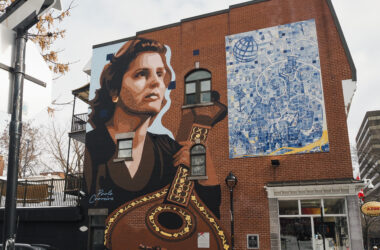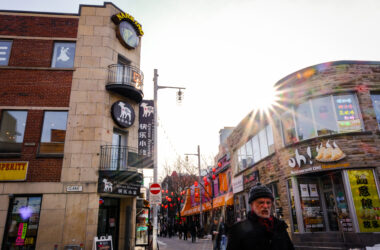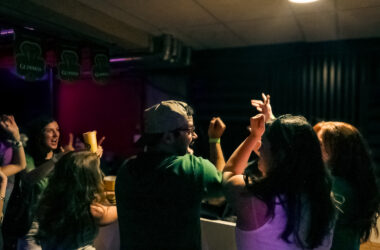In cafe-bar Casa del Popolo, one might notice signs, printed in both French and English, that read, “If you feel unsafe in any way, don’t hesitate to talk to your bartender.” In the bathrooms, these signs are hard to miss; one is placed above the mirror, and another over the toilet. A more detailed explanation of its non-violence policy is posted below the mirror.
Xarah Dion, staff member for seven years, still vividly remembers the night two years ago when a customer was being choked by her date right inside Casa del Popolo. This attack was a game-changer for the staff at the Mile End establishment.
“[The staff] decided enough was enough,” Dion said. Since the incident, Casa del Popolo has instituted an attitude of zero tolerance toward violence, and is taking measures to ensure that its staff are able to appropriately handle unsafe situations when they arise. In the coming months, Casa del Popolo intends to engage its staff in a mandatory workshop with local Montreal non-profit organization Head & Hands to help the servers and bartenders learn more about violence and its prevention.
“It is crucial to learn how to help, it’s not enough to offer help,” Dion said.
In the age of online dating and the explosive popularity of match-making websites and apps like Tinder and Bumble, this generation’s version of blind-dating has reshaped traditional dating culture. For many people, the first date entails meeting someone for the first time, with very little background information. Although blind dating can greatly expand one’s dating pool, it can come with safety risks. Moreover, the alcohol-fuelled environment of a bar can make customers more vulnerable to unsafe interactions. Though there are a plethora of unknowns with each bar visit, having bar staff as a source of protection is a comfort to customers.
Initiatives like the one at Casa del Popolo are popping up in bars across Canada and around the world. Most are inspired by a campaign called ‘Ask for Angela,’ which allows patrons to walk up to the bar and ask for ‘Angela’ as a signal that they’re in trouble. By discreetly alerting the bartender using these code words, individuals who find themselves in a difficult situation are assisted promptly. Knowing this policy is in place can also increase the sense of security that customers feel upon entering the bar.
The initiative was started in 2016 in England by a woman named Hayley Child. According to BBC News, the name ‘Angela,’ which Child created, is a play on the word ‘Guardian Angel.’ Last November, the campaign went viral after a poster explaining its procedure that was hung in a bar in Lincolnshire, England was retweeted over 28,000 times. Internet users across the world are voicing their approval of the idea, requesting that this initiative be implemented worldwide.
As the campaign spreads, bars have taken on different variations of the code language to suit their needs. For example, The ‘Angel Shot’ takes this concept to the next level, by providing customers with a discreet way to request the bartender’s specialized help depending on the specific version of the shot one orders. If the customer orders the shot “neat,” the bartender knows to escort the customer to his or her vehicle; when ordering “with ice,” bartenders will call the customer an Uber or taxi ride home; and ordering “with a lime on the side” lets bartenders know to call the police.
Beyond directly improving the security of patrons, advertising these non-violence policies at bars can spark discussion among customers that creates a more safe and aware bar environment.
“If some people find it shocking, that’s good,” Dion said. “It’s something that people should always have in mind, and some people don’t. And maybe [for] the people that feel shocked by these signs, [they have] a positive impact.”
On McGill’s campus, the ‘Ask for Angela’ concept is gaining traction, though it has yet to be implemented in any of the university’s bars or restaurants.
Tim Mapley, U3 Arts and manager of Gerts, hopes that the campus bar won’t need an ‘Ask for Angela’ policy.
“If the McGill community felt like there was [a] need, we would likely have no problem implementing something like that,” Mapley said. “Safety of patrons is our top priority. We pride ourselves on being a safe space.”
According to Mapley, Gerts works hard to create a safe and responsible environment with vigilant security, reliable male and female staff, and its close connections with WalkSafe and MSERT—two student-run groups that prioritize students’ safety on nights out.
Beyond the existing risks present at any bar environments, exposure to a wide array of strangers through dating apps has heightened these risks. Implementing campaigns, such as ‘Ask For Angela,’ is an effective way for bars and clubs to create safer spaces for those exploring the possibilities of the dating scene.
For more information on the original campaign and tips to implement the “Ask for Angelia” policy visit www.lincolnshire.gov.uk/nomore










Strangers are incredibly dangerous and should be avoided.